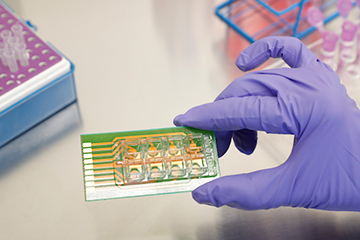
06/04/2024
Jasmin Kaur Ghotra and her faculty mentor, Professor of Biological Sciences Christa Chatfield, are hot on the trail of a legionella bacterium that is found in the man-made water system.
“This bacterium causes the severe type of pneumonia and mild flu-like illness,” Ghotra said of the study, titled “Role Amyloid-Forming Proteins Play in Persistence of Legionella Pneumophila in Man-Made Water System.”
“We are aiming to develop strategies for preventing and removing Legionella from water systems, thereby reducing the risk of outbreaks.”
During this research, the pair will try to identify the unknown protein that is responsible for amyloid formation, said Ghotra, a sophomore biology major from Germany. Amyloids play a key role in the growth of Legionella bacterium. A greater understanding could lead to more effective ways to prevent its spread.
Ghotra is one of 12 SUNY Cortland undergraduate research summer fellows, continuing the university’s 18-year-old program in 2024.
SUNY Cortland’s summer student research program, managed by its Undergraduate Research Council, provides students with a residence hall bed, campus research space and a $4,000 stipend during eight weeks of full-time study from late May through early August. The Council gives an additional $2,000 to faculty members who mentor a student. The students present the results of their studies at the school’s annual Transformations conference.
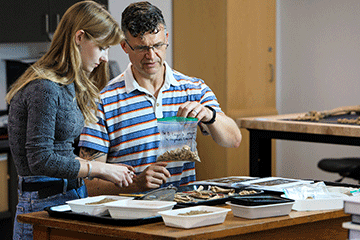
This year’s participants include students majoring in biology, chemistry, exercise science, history, psychology, communication disorders and sciences, sociology/anthropology, political science and fine arts.
In addition to Ghotra, these researchers include:
- Ian Durso, a senior history major from Ithaca, N.Y., is researching “Muslims and American Schooling, How Public School Students in New York See and Understand Islam and What Can We Do to Make It Better.”
“This fellowship focuses on educating New York's 9th-10th grade students on Islam and Muslims,” Durso said. “The goal is to modify the 9th through 10th grade New York state social/global studies curriculum using analysis and previous survey data, said Durso, whose mentor is Anisha Saxena, assistant professor of history.
“We will also build a primary source database on early Muslim history to be used in class.”
- Christopher Faherty, a senior chemistry major from Vernon, N.Y., wants to build a better glass molecule.
When a liquid is cooled fast enough, it cools in such a way that it forms a glass, he explained.
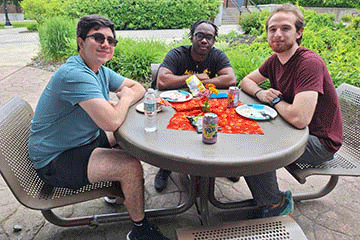
“Over time, this glass can crystallize because it is unstable. This research is focused on making new molecules with different properties to better understand the chemistry of crystallization with and without polymer additives.”
Sarah Wolf, assistant professor of chemistry, serves as his faculty mentor on the project, “Crystallization of Amorphous Solids in Small Molecule Glasses.”
- Evan Beaudry wants to design and make a small, simple inorganic metal complex that completes the same chemistry as a highly evolved protein called farnesyl transferase that is found in the human body.
"It is basically a tag that allows the protein to end up in the correct place in the cell so it can complete its function," Beaudry said about the goal of his planned research." He noted that the process, called 'farnesylation,' is a hot topic in drug synthesis.
"So it is a very useful thing," he said.
The junior biomedical science major from Mississauga, Ontario, Canada, is working on this project under faculty mentor Andrew Roering, associate professor of chemistry.
“If successful we will be the first to mimic this type of protein,” Beaudry said of the project, titled “Small Molecule Enzyme Mimetics using Zinc.”
- Nadiya Grossman of Rhinebeck, N.Y., is assessing where New York states’ COVID-19 social support measures stand today.
The junior political science major is working with Juan Prieto, assistant professor of political science, is working to find out.
“I’m going to analyze what caused programs to be abandoned or become permanent using R, an integrated development environment for the programming language R (used for statistical computing and graphics),” Grossman said of the project, “Pandemic-Time Social Protection: Between a New and an Old Normal.” .
“Then, I will select three states for an in-depth case study analysis.”
- Gwyneth Laukaitis, a junior biomedical science major from Cortlandt Manor, N.Y., aspires to advance knowledge in the field of exercise science — her minor — through her investigation under Associate Professor of Kinesiology Kevin Dames.
“My research examines the time to stabilize after a single-leg jump among female varsity athletes in sports like field hockey, lacrosse, and soccer, compared to active females aged 18 to 30,” Laukaitis said about her study of ball sport teams.
“We assess asymmetry between legs to identify injury risks, aiding targeted strength training and informed return-to-sport decisions post-injury,” Laukaitis said.
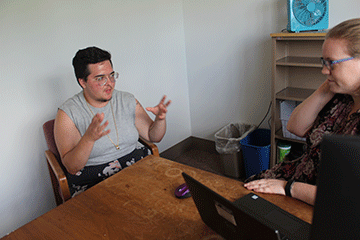
- Chloe Loewenguth of Syracuse, N.Y., who graduates this fall with a Bachelor of Fine Arts degree in sculpture, is researching, is designing and building an experimental ergonomic iron furnace to be used for cast iron sculpture.
“I will be collecting data in order to create a standardized system of furnace construction, while also experimenting with alternative and sustainable fuel sources,” said Loewenguth, whose work is mentored by Vaughn Randall, associate professor of art and art history.
- Sasha Machmuller a senior psychology major from McGraw, N.Y., is exploring whether there is a link between fandom identity and online radicalization, as evidenced in the instance of Gypsy Rose Blanchard. Machmuller is guided by Karen Davis, associate professor of psychology.
Led by the 2019 findings of Finnish researchers Jenni Raitanen and Atte Oksanen, Machmuller is exploring what happens when an individual accepts increasingly extreme ideas through online interactions that may lead to violent behavior by examining social media posts on accounts about Blanchard, who killed her abusive mother.
- Morgan Proulx of Rochester, N.Y., wants to see if providing caregivers of children with autism strategies may make reading experiences for their children more engaging.
The senior speech and hearing science major has partnered with Nimisha Muttiah, assistant professor of communication disorders and sciences.
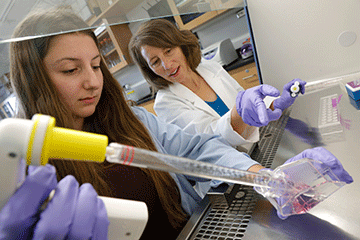
Annabella Nillon's summer 2022 research fellowship with Theresa Curtis, professor of Biological Sciences, involved developing olfactory cell-based biosensors.
“Through an online program, I will train caregivers in a communication strategy called ‘Read and remove, Ask, Answer, Prompt (R2AAP),’ which they will use during adapted shared book reading with their children with autism spectrum disorder,” Proulx noted.
“The adult may point to words as they read, pause, and ask the child questions, and invite the child to share their thinking about the book,” Proulx explains in her project abstract. “For children with autism who have communication and social skills challenges, it can be difficult for them to engage in shared book-reading activities. Adapted shared book reading in this study refers to having removable picture elements in the book, strategies are tailored for individuals with autism. For instance, an illustration of a dog in the book may be photocopied, laminated, and attached to the book by Velcro; the caregiver can manipulate the object and story.”
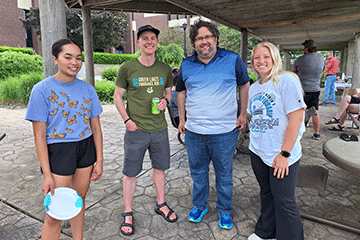
Additional students participating as undergraduate summer research fellows include:
- Angel Alicea-Morales, who is investigating “Insights into AspA Enzyme and Potential Therapeutic Targets” under the mentorship of Christian Nelson, associate professor of biological sciences and pre-medical and pre-dental advisor.
- Janet Martinez presently is engaged in “Archaeobotanical Research at Çadir Höyük, Türkiye” with SUNY Distinguished Professor Sharon Steadman, a professor of sociology/anthropology.
- Ava Miranov is exploring “Fission Regulation and Regeneration in Terrestrial Planarians” under the mentorship of Distinguished Teaching Professor Peter Ducey in the Biological Sciences Department.
In recent times including this year, every student’s summer research fellowship has been supported by the generosity of alumni and friends in the form of permanent undergraduate research endowments managed by the Cortland College Foundation.
- This summer’s research by Durso, Grossman and Martinez is being funded by a fellowship from the late Nancy A. Johnson ’48, M ’56.
- The scholarship of Laukaitis and Proulx is supported by an endowment from Bernie LoBracco M ’74 and Karen LoBracco ’74.
- The research by Alicea-Morales and Faherty is being funded by a fellowship created by Daniel G. Scheffer ’96.
- Machmuller’s scholarship is being supported by the William H. Hopkins fellowship created by Sheri Baron ’77.
- Ghotra’s research is being funded by the David F. Berger, Ph.D. fellowship endowed by Dr. Michael J. Bond ’75 and Dr. Wayne Marley ’75.
- Loewenguth’s work is underwritten by an endowment set up by Sandra Laghi Cerulli ’68 and Dr. Maurice Cerulli.
- Miranov’s scholarship is being supported by a fellowship from W. Hubert Keen, Ph.D., and Sally Keen.
- Beaudry’s work is being underwritten by a fellowship created by Michael J. O’Reilly ’58.